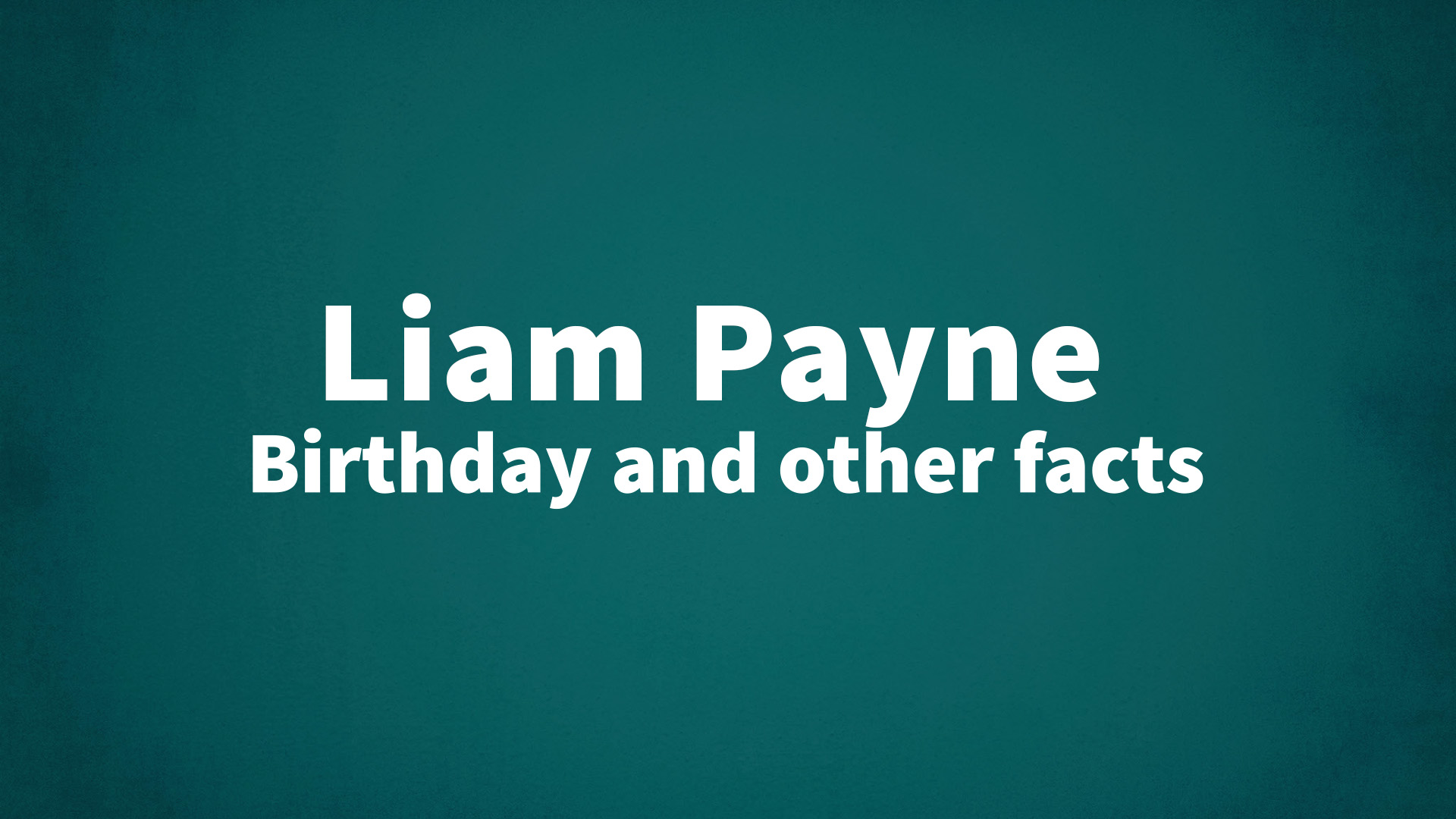Have you ever found yourself humming along to a One Direction tune, only to pause when Liam Payne's name comes up, wondering how to say it just right? It's a common little puzzle, actually. For fans who've followed his journey from the boy band days to his solo career, getting his name to roll off the tongue with ease is, you know, a pretty big deal. It just feels good to speak about someone you admire with proper respect for their identity, doesn't it?
A lot of people, too, find that figuring out how to voice certain celebrity names can be a bit of a head-scratcher. Liam Payne’s name, with its rather distinct sounds, often prompts questions about the correct way to speak it aloud. It's not always as simple as just reading it, and there are some specific elements that make it unique.
This article aims to clear up any lingering questions about saying "Liam Payne." We'll look at the parts of his name, offer some practical ways to practice, and even explore a little bit about where the name itself comes from. So, if you're keen to sound like you've got it all figured out when chatting about him, you're definitely in the right spot.
Table of Contents
- Liam Payne - A Quick Look at His Journey
- How Do You Actually Say 'Liam Payne' The Right Way?
- Is There a Trick to Getting 'Liam Payne' Pronunciation Down?
- Why Does the 'Liam Payne' Pronunciation Seem So Tricky for Some?
- What's the Story Behind the Name 'Liam Payne' Anyway?
- Improving Your Speaking Skills with 'Liam Payne'
- Global Reach - 'Liam Payne' Across Languages
- Why Getting 'Liam Payne' Right Really Matters
Liam Payne - A Quick Look at His Journey
Liam James Payne, a fellow from England, really made a name for himself as a vocalist and a writer of songs. He first came into the public eye as a part of the incredibly popular music group, One Direction. This group, which basically took over the world, was formed back in 2010 on a television show that looked for new talent. His voice and presence helped make the band one of the biggest acts on the planet, selling millions of records and playing to huge crowds everywhere. After the group decided to take a break, Liam started putting out his own solo music, showing off a slightly different side to his artistic expression. He has, in a way, continued to capture the attention of music lovers across the globe with his work, both alone and with others.
His time with One Direction, honestly, shaped a whole generation of pop music. They were, you know, a truly remarkable phenomenon, and Liam was a central piece of that puzzle. He's been known for his distinctive vocal contributions and for being a steady presence within the group. Even after the band went their separate ways, his connection to that period of music history remains very strong, and people often talk about his time there. He's a rather well-known figure, especially among those who followed the band's rise to fame.
Personal Details and Bio Data
| Full Name | Liam James Payne |
| Occupation | Singer, Songwriter |
| Nationality | British |
| Known For | Former member of One Direction |
| Birth Date | August 29, 1993 |
| Birth Place | Wolverhampton, England |
How Do You Actually Say 'Liam Payne' The Right Way?
Getting the sounds right when you say "Liam Payne" is, you know, easier than you might think once you break it down. The first part, "Liam," is spoken with two distinct sound chunks. It starts with a "lee" sound, almost like the beginning of the word "leaf," and then finishes with a soft "um" sound, like the end of "gum." So, you get "Lee-um." It's not "Lie-am" or "Lye-um," which some folks might mistakenly say. It's really just a straightforward "Lee-um" sound, quite common for this name. You can, for instance, think of it as two quick, clear parts, not rushed together.
Now, for the second part, "Payne," it's pretty much said just as it looks. It has that "pay" sound, like what you do with money, followed by a gentle "n" sound at the end. So, it's "Payn." There's no silent letter or unusual twist to it, which is rather helpful. When you put it all together, you get "Lee-um Payn." It's actually quite simple when you focus on each piece separately, rather than trying to get the whole thing in one go. You could, perhaps, even try to stretch out each sound a little when you first practice, just to make sure you're hitting all the right notes.
To really get the feel for the 'liam payne how to pronounce' flow, you might want to try saying each bit out loud, giving a bit of extra oomph to each sound until you can say it smoothly without any hiccups. For example, make sure the "Lee" part of "Liam" is nice and clear, and the "Pay" in "Payne" is equally crisp. It's almost like stretching out a rubber band and then letting it snap back into place. This method can help you build muscle memory for your mouth and tongue, making the correct pronunciation feel more natural over time. You'll find, I mean, that consistency is a big helper here.
Is There a Trick to Getting 'Liam Payne' Pronunciation Down?
Well, there are a few clever ways to really nail the 'liam payne how to pronounce' puzzle. One of the best methods, arguably, is to listen closely to people who speak English as their first language. When you hear them say "Liam Payne," try to copy the sounds they make. It's a bit like learning a song by ear; you pick up on the rhythm and the tune. There are, for instance, many places online where you can hear audio clips of his name being spoken. Just listening repeatedly and trying to echo what you hear can make a huge difference in how your own speech sounds. It's a very straightforward way to get better.
Another helpful hint is to pay attention to where the emphasis falls in the name. For "Liam Payne," the stress, or the part you say with a bit more force, is on the first part of "Liam" – the "Lee" sound. So, it's "LEE-um Payn," not "Lee-UM Payn" or "Lee-um PAYN." Knowing this can really help you avoid saying it in a way that sounds a little off. It’s a subtle thing, but it makes the name sound much more natural. You'll find that this little detail, in some respects, ties the whole sound together properly.
You could also try recording your own voice saying "Liam Payne" and then playing it back. This is, you know, a pretty effective way to catch any spots where you might be making a mistake. Sometimes, what we think we're saying isn't quite what's coming out, and hearing it back can give you a fresh perspective. You might notice, for example, that you're rushing a sound or not quite getting the vowel right. It's a bit like looking in a mirror to fix your hair; you see what needs adjusting. This practice, too, can boost your confidence when you finally say the name out loud in conversation.
Why Does the 'Liam Payne' Pronunciation Seem So Tricky for Some?
The name "Liam Payne" can feel a little bit like a puzzle for some people, and there's a good reason for that. The first name, "Liam," has roots in Irish language traditions. While it's widely used in English-speaking places now, its original background gives it a certain sound quality that might not be immediately obvious to everyone. It's not a common English name like "John" or "Mary" where the pronunciation is, you know, almost universally known. This unique blend of sounds can sometimes trip people up, making them wonder if there's a hidden rule they're missing.
Many names that come from different language backgrounds carry a slight whisper of their origins, and "Liam" is one of those. Even though it's become a popular name in English, the way it's spoken, with that clear "Lee-um" sound, might not be what someone expects if they're used to different sound patterns in English. It's a bit like trying to say a word from another country; sometimes the sounds just don't line up with what you're used to. This can make the 'liam payne how to pronounce' question pop up quite often, especially for those who are learning English or are not familiar with Irish names.
Also, the combination of "Liam" and "Payne" together creates a specific rhythm. While "Payne" is pretty straightforward, the two-syllable "Liam" followed by the single-syllable "Payne" means you have to shift your mouth a little differently than if both parts were one syllable or had a different stress pattern. It’s almost like a small dance your mouth has to do. For instance, if you're not used to that particular sequence of sounds, it can feel a little awkward at first. But with a bit of practice, it becomes quite natural, as a matter of fact.
What's the Story Behind the Name 'Liam Payne' Anyway?
The name "Liam" has a really interesting story, actually. It's not just a modern invention; it goes way back. "Liam" is a shorter way of saying "Uilliam," which is the Irish version of the older Germanic name "William." So, when you say "Liam," you're carrying a piece of history with you. The name "William" itself has been around for a very long time, tracing its roots all the way back to the Norman Conquest of England in 1066. It's quite a historical connection for a name that feels so current.
The meaning behind "Liam" is also pretty cool. It's often said to mean "desired helmet" or "protector." So, it carries with it a sense of strength and care. This meaning comes from the original "William," which combines elements that suggest protection and resolve. It's a name that has, in a way, stood the test of time, carrying a powerful message through generations. You know, it's pretty neat when a name has such a strong sense of purpose behind it.
In terms of its popularity, "Liam" has become a really big deal, especially in recent years. It's been the top choice for boys in the United States for a while now, holding that number one spot for eight years straight. It's also incredibly popular in other Western countries. This rise in popularity in places like the United Kingdom started in the 1980s and then really took off in Europe and the Americas after that. It's almost like everyone suddenly realized what a great name it is. So, when you hear "Liam Payne," you're hearing a name that's both deeply historical and very much a part of today's naming trends.
Improving Your Speaking Skills with 'Liam Payne'
Practicing how to say "Liam Payne" correctly can, believe it or not, be a really useful way to make your overall English speaking skills better. When you focus on getting a specific name right, you're also working on things like how you move your mouth, how you shape sounds, and where you put the stress in words. It's like a mini-lesson in phonetics without even realizing it. This kind of specific practice helps your tongue and lips get used to making certain sounds, which then makes it easier to say other English words fluently. It's a pretty practical approach, if you think about it.
This kind of detailed practice also helps with your general word knowledge. As you learn to pronounce "Liam Payne," you're paying closer attention to the individual sounds that make up English words. This can, in turn, help you with other words that might have similar sound patterns or tricky parts. It's almost like a warm-up exercise for your speaking muscles. You're not just learning one name; you're actually building a stronger foundation for your speech. You know, it’s a small step that can lead to bigger improvements.
And it's not just about sounding good for celebrity names. Getting a handle on how to say "liam payne how to pronounce" can also help you feel more sure of yourself when talking about viral topics or things that are currently in the news. When you can speak clearly and correctly about trending subjects, it makes you feel more confident in conversations. This tutorial, for example, is designed to help you speak words with more ease, which then helps you speak with more confidence in general. It's all about building that comfort level with the language, really.
Global Reach - 'Liam Payne' Across Languages
It's pretty fascinating to consider how a name like "Liam Payne" gets said in different languages. While the core English pronunciation is what most people aim for, you can actually learn how to say "liam payne how to pronounce" in a few other tongues, too. This shows just how widespread his fame is and how people from all sorts of language backgrounds connect with his music. You can find guides, for instance, that show you how to say his name in French, Spanish, German, or even Hindi. It's quite a testament to his global appeal, you know.
Each language has its own particular way of making sounds, and sometimes a name like "Liam Payne" might sound a little different when spoken by someone from, say, France compared to someone from Germany. The basic structure of the name stays the same, of course, but the subtle shifts in vowel sounds or the way certain letters are articulated can change things up a bit. It's a bit like hearing a song covered by different artists; the melody is there, but the style is unique. This can be a really interesting aspect to explore if you're into language learning or just curious about how sounds change across cultures.
Learning these variations can also be a fun way to broaden your own speaking horizons. It gives you a little peek into how different language systems work and how they adapt foreign words. So, while the main goal is often to get the English pronunciation down, knowing that his name has a presence in other languages just adds another layer to the story of "Liam Payne." It's almost like a small cultural exchange every time someone from a different country says his name. You might even find it helps you better understand how sounds are formed in your own language, in some respects.
Why Getting 'Liam Payne' Right Really Matters
For anyone who follows pop music, especially those who grew up with One Direction, getting the 'liam payne how to pronounce' bit right is actually quite important. It shows a basic level of respect for the person and their identity. When you talk about an artist, you want to make sure you're saying their name correctly, just as you would with any person you're discussing. It's a simple courtesy that helps you connect better with fellow fans and anyone else interested in the music scene. You know, it just feels right to get it correct.
Beyond just showing respect, speaking an artist's name properly also helps with clear communication. If everyone says "Liam Payne" in a similar way, there's less confusion about who you're talking about. In the music business, where names are constantly being mentioned in interviews, articles, and fan discussions, having a consistent pronunciation helps keep things smooth. It's a very practical aspect of everyday conversation, as a matter of fact. It ensures that when you mention his latest song or a memory from a concert, everyone knows exactly who you mean.
Ultimately, knowing how to say "Liam Payne" with ease is a small but meaningful part of being a well-informed fan or someone who stays current with popular culture. It's a detail that, in a way, completes your knowledge about him and his place in the world of music. It's about feeling confident and accurate when you talk about someone who has brought a lot of joy to many people. So, taking the time to learn this little piece of information is, you know, a worthwhile effort.



Author Details:
- Name : Valerie Mosciski
- Username : ibashirian
- Email : olen99@breitenberg.info
- Birthdate : 1982-11-06
- Address : 689 Thiel View Brandiburgh, HI 38877
- Phone : 458.423.4208
- Company : Wisozk Group
- Job : Painting Machine Operator
- Bio : Sed cum aliquam ad ut sequi dolorem tenetur consequatur. Sit dignissimos veritatis similique. Culpa eum ipsa nam molestiae.
Social Media
Facebook:
- url : https://facebook.com/ottilie_xx
- username : ottilie_xx
- bio : Qui quos quam eos vel ut. Eum placeat et dicta.
- followers : 6817
- following : 1940
Tiktok:
- url : https://tiktok.com/@ottilie2401
- username : ottilie2401
- bio : Ut aut quod sed. Earum exercitationem id qui dolorem minima aut.
- followers : 2535
- following : 255
Twitter:
- url : https://twitter.com/ottilie_official
- username : ottilie_official
- bio : Ullam cum qui sunt debitis laboriosam. Minima minima pariatur et. Quia consequuntur exercitationem quibusdam blanditiis odit.
- followers : 2531
- following : 800
